Sustainable and Responsible Management in Tourism
VerifiedAdded on 2023/06/11
|10
|2731
|438
AI Summary
This report discusses sustainable and responsible management in tourism businesses and destinations in the UK. It covers the principles of sustainable tourism, theories of sustainability, innovative ideas and skills for sustainable tourism, and opportunities for enhancing tourism businesses. The report emphasizes the importance of social, economic, and cultural sustainability along with environmental sustainability.
Contribute Materials
Your contribution can guide someone’s learning journey. Share your
documents today.
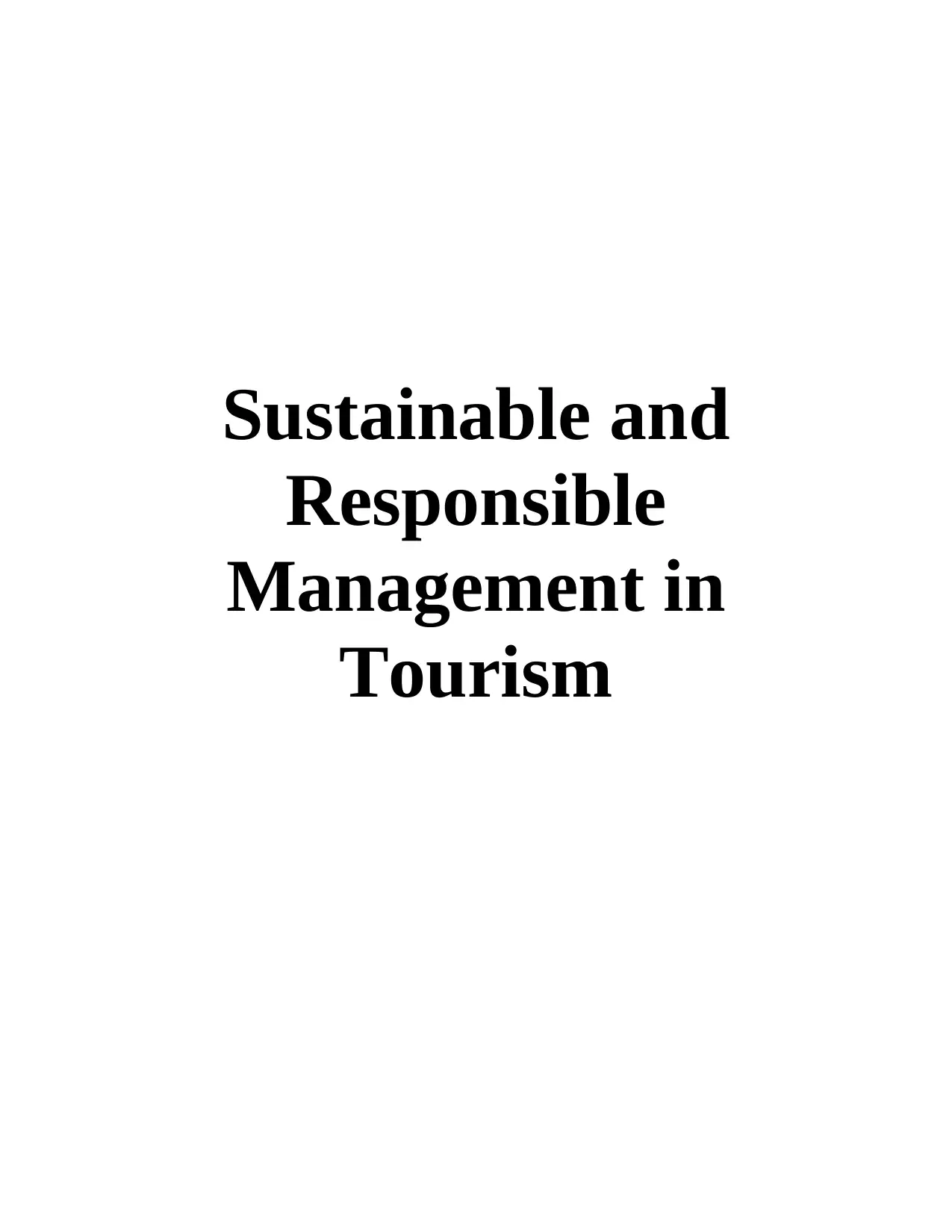
Sustainable and
Responsible
Management in
Tourism
Responsible
Management in
Tourism
Secure Best Marks with AI Grader
Need help grading? Try our AI Grader for instant feedback on your assignments.

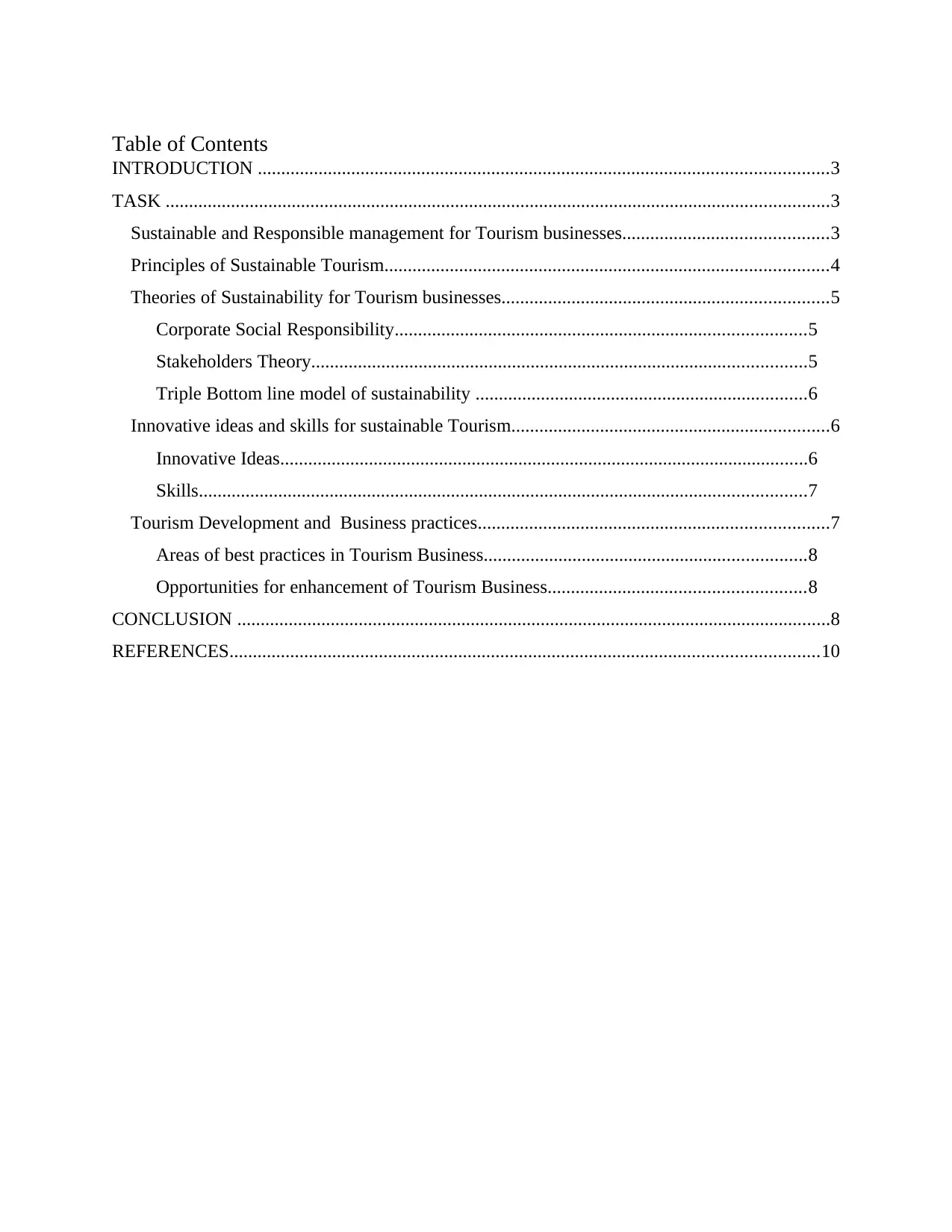
Table of Contents
INTRODUCTION ..........................................................................................................................3
TASK ..............................................................................................................................................3
Sustainable and Responsible management for Tourism businesses............................................3
Principles of Sustainable Tourism...............................................................................................4
Theories of Sustainability for Tourism businesses......................................................................5
Corporate Social Responsibility........................................................................................5
Stakeholders Theory..........................................................................................................5
Triple Bottom line model of sustainability .......................................................................6
Innovative ideas and skills for sustainable Tourism....................................................................6
Innovative Ideas.................................................................................................................6
Skills..................................................................................................................................7
Tourism Development and Business practices...........................................................................7
Areas of best practices in Tourism Business.....................................................................8
Opportunities for enhancement of Tourism Business.......................................................8
CONCLUSION ...............................................................................................................................8
REFERENCES..............................................................................................................................10
INTRODUCTION ..........................................................................................................................3
TASK ..............................................................................................................................................3
Sustainable and Responsible management for Tourism businesses............................................3
Principles of Sustainable Tourism...............................................................................................4
Theories of Sustainability for Tourism businesses......................................................................5
Corporate Social Responsibility........................................................................................5
Stakeholders Theory..........................................................................................................5
Triple Bottom line model of sustainability .......................................................................6
Innovative ideas and skills for sustainable Tourism....................................................................6
Innovative Ideas.................................................................................................................6
Skills..................................................................................................................................7
Tourism Development and Business practices...........................................................................7
Areas of best practices in Tourism Business.....................................................................8
Opportunities for enhancement of Tourism Business.......................................................8
CONCLUSION ...............................................................................................................................8
REFERENCES..............................................................................................................................10
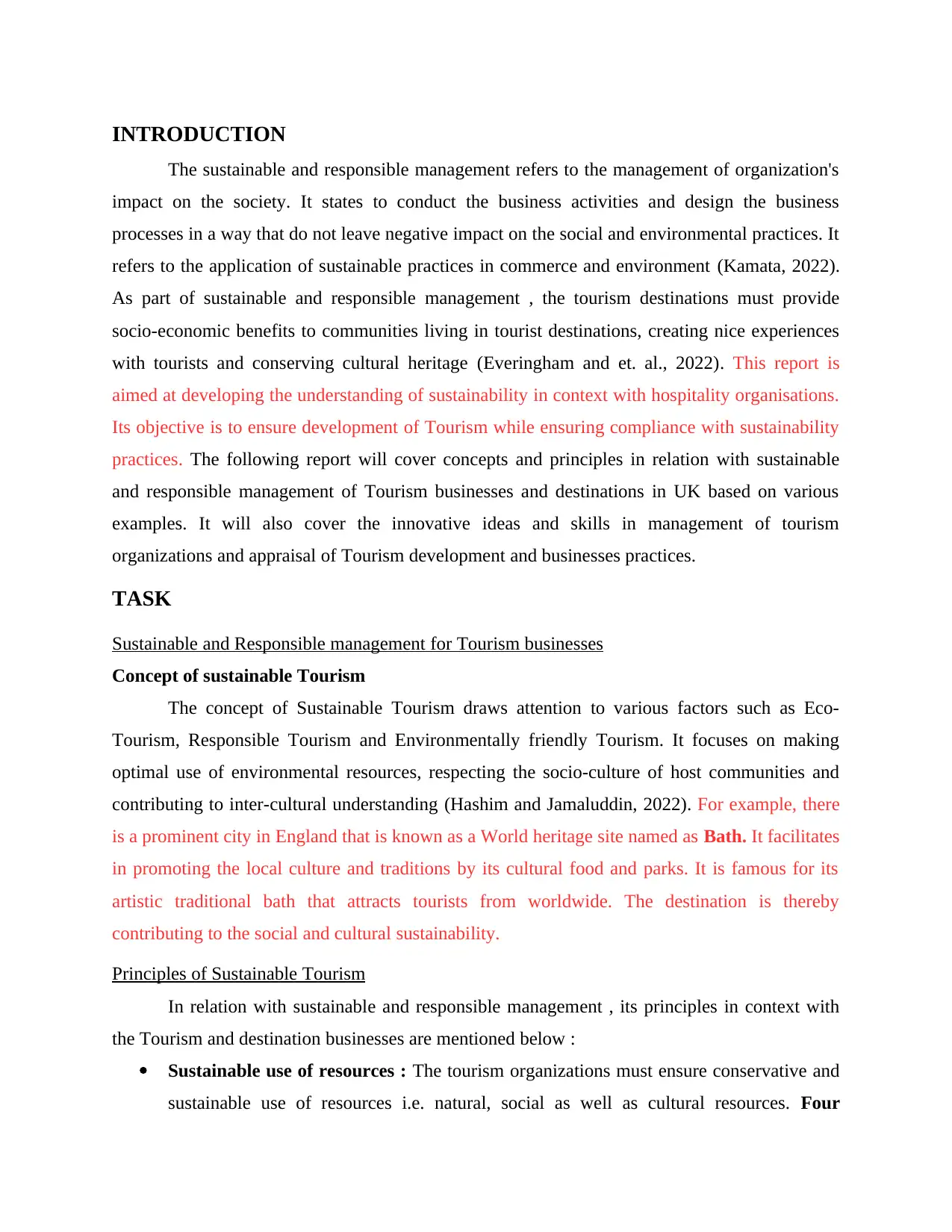
INTRODUCTION
The sustainable and responsible management refers to the management of organization's
impact on the society. It states to conduct the business activities and design the business
processes in a way that do not leave negative impact on the social and environmental practices. It
refers to the application of sustainable practices in commerce and environment (Kamata, 2022).
As part of sustainable and responsible management , the tourism destinations must provide
socio-economic benefits to communities living in tourist destinations, creating nice experiences
with tourists and conserving cultural heritage (Everingham and et. al., 2022). This report is
aimed at developing the understanding of sustainability in context with hospitality organisations.
Its objective is to ensure development of Tourism while ensuring compliance with sustainability
practices. The following report will cover concepts and principles in relation with sustainable
and responsible management of Tourism businesses and destinations in UK based on various
examples. It will also cover the innovative ideas and skills in management of tourism
organizations and appraisal of Tourism development and businesses practices.
TASK
Sustainable and Responsible management for Tourism businesses
Concept of sustainable Tourism
The concept of Sustainable Tourism draws attention to various factors such as Eco-
Tourism, Responsible Tourism and Environmentally friendly Tourism. It focuses on making
optimal use of environmental resources, respecting the socio-culture of host communities and
contributing to inter-cultural understanding (Hashim and Jamaluddin, 2022). For example, there
is a prominent city in England that is known as a World heritage site named as Bath. It facilitates
in promoting the local culture and traditions by its cultural food and parks. It is famous for its
artistic traditional bath that attracts tourists from worldwide. The destination is thereby
contributing to the social and cultural sustainability.
Principles of Sustainable Tourism
In relation with sustainable and responsible management , its principles in context with
the Tourism and destination businesses are mentioned below :
Sustainable use of resources : The tourism organizations must ensure conservative and
sustainable use of resources i.e. natural, social as well as cultural resources. Four
The sustainable and responsible management refers to the management of organization's
impact on the society. It states to conduct the business activities and design the business
processes in a way that do not leave negative impact on the social and environmental practices. It
refers to the application of sustainable practices in commerce and environment (Kamata, 2022).
As part of sustainable and responsible management , the tourism destinations must provide
socio-economic benefits to communities living in tourist destinations, creating nice experiences
with tourists and conserving cultural heritage (Everingham and et. al., 2022). This report is
aimed at developing the understanding of sustainability in context with hospitality organisations.
Its objective is to ensure development of Tourism while ensuring compliance with sustainability
practices. The following report will cover concepts and principles in relation with sustainable
and responsible management of Tourism businesses and destinations in UK based on various
examples. It will also cover the innovative ideas and skills in management of tourism
organizations and appraisal of Tourism development and businesses practices.
TASK
Sustainable and Responsible management for Tourism businesses
Concept of sustainable Tourism
The concept of Sustainable Tourism draws attention to various factors such as Eco-
Tourism, Responsible Tourism and Environmentally friendly Tourism. It focuses on making
optimal use of environmental resources, respecting the socio-culture of host communities and
contributing to inter-cultural understanding (Hashim and Jamaluddin, 2022). For example, there
is a prominent city in England that is known as a World heritage site named as Bath. It facilitates
in promoting the local culture and traditions by its cultural food and parks. It is famous for its
artistic traditional bath that attracts tourists from worldwide. The destination is thereby
contributing to the social and cultural sustainability.
Principles of Sustainable Tourism
In relation with sustainable and responsible management , its principles in context with
the Tourism and destination businesses are mentioned below :
Sustainable use of resources : The tourism organizations must ensure conservative and
sustainable use of resources i.e. natural, social as well as cultural resources. Four
Secure Best Marks with AI Grader
Need help grading? Try our AI Grader for instant feedback on your assignments.
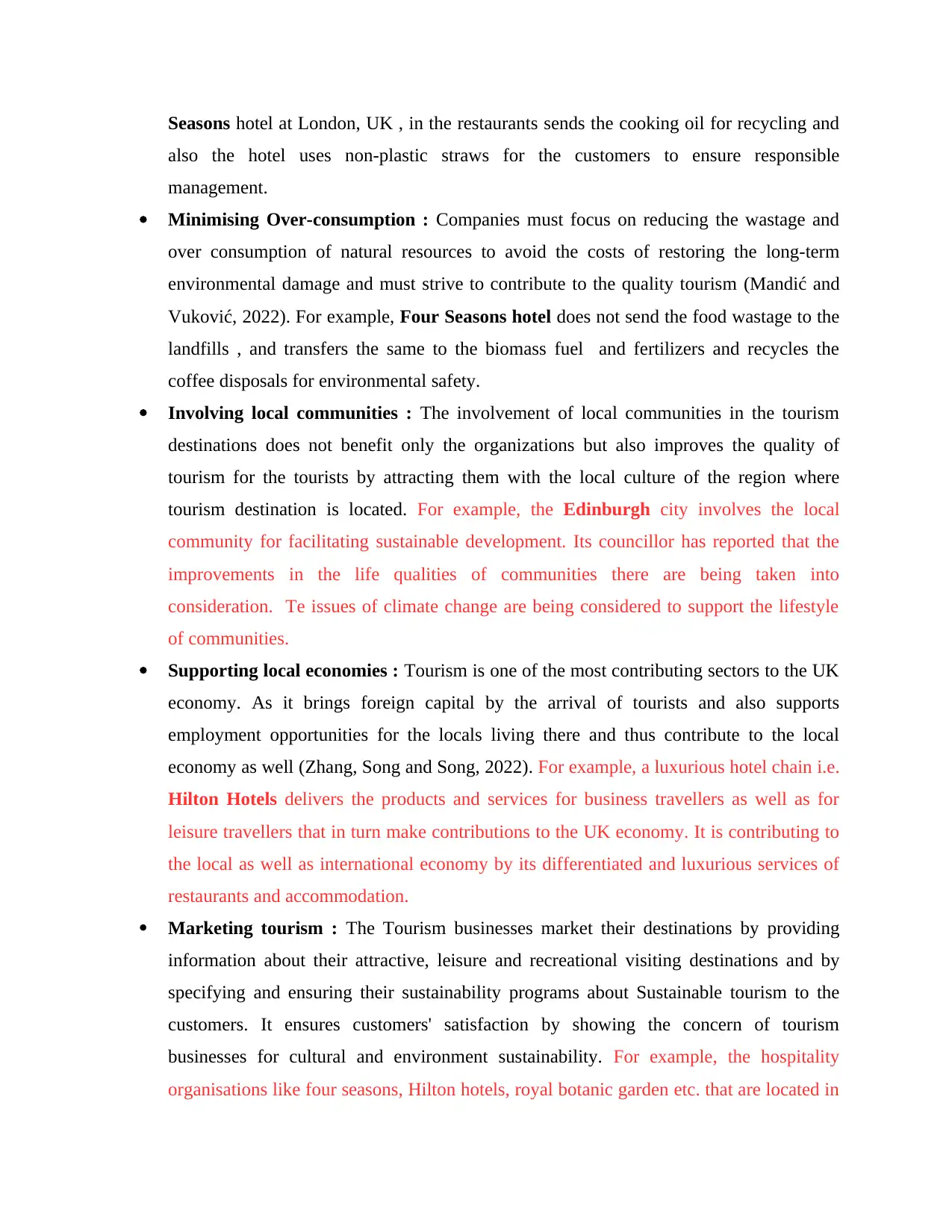
Seasons hotel at London, UK , in the restaurants sends the cooking oil for recycling and
also the hotel uses non-plastic straws for the customers to ensure responsible
management.
Minimising Over-consumption : Companies must focus on reducing the wastage and
over consumption of natural resources to avoid the costs of restoring the long-term
environmental damage and must strive to contribute to the quality tourism (Mandić and
Vuković, 2022). For example, Four Seasons hotel does not send the food wastage to the
landfills , and transfers the same to the biomass fuel and fertilizers and recycles the
coffee disposals for environmental safety.
Involving local communities : The involvement of local communities in the tourism
destinations does not benefit only the organizations but also improves the quality of
tourism for the tourists by attracting them with the local culture of the region where
tourism destination is located. For example, the Edinburgh city involves the local
community for facilitating sustainable development. Its councillor has reported that the
improvements in the life qualities of communities there are being taken into
consideration. Te issues of climate change are being considered to support the lifestyle
of communities.
Supporting local economies : Tourism is one of the most contributing sectors to the UK
economy. As it brings foreign capital by the arrival of tourists and also supports
employment opportunities for the locals living there and thus contribute to the local
economy as well (Zhang, Song and Song, 2022). For example, a luxurious hotel chain i.e.
Hilton Hotels delivers the products and services for business travellers as well as for
leisure travellers that in turn make contributions to the UK economy. It is contributing to
the local as well as international economy by its differentiated and luxurious services of
restaurants and accommodation.
Marketing tourism : The Tourism businesses market their destinations by providing
information about their attractive, leisure and recreational visiting destinations and by
specifying and ensuring their sustainability programs about Sustainable tourism to the
customers. It ensures customers' satisfaction by showing the concern of tourism
businesses for cultural and environment sustainability. For example, the hospitality
organisations like four seasons, Hilton hotels, royal botanic garden etc. that are located in
also the hotel uses non-plastic straws for the customers to ensure responsible
management.
Minimising Over-consumption : Companies must focus on reducing the wastage and
over consumption of natural resources to avoid the costs of restoring the long-term
environmental damage and must strive to contribute to the quality tourism (Mandić and
Vuković, 2022). For example, Four Seasons hotel does not send the food wastage to the
landfills , and transfers the same to the biomass fuel and fertilizers and recycles the
coffee disposals for environmental safety.
Involving local communities : The involvement of local communities in the tourism
destinations does not benefit only the organizations but also improves the quality of
tourism for the tourists by attracting them with the local culture of the region where
tourism destination is located. For example, the Edinburgh city involves the local
community for facilitating sustainable development. Its councillor has reported that the
improvements in the life qualities of communities there are being taken into
consideration. Te issues of climate change are being considered to support the lifestyle
of communities.
Supporting local economies : Tourism is one of the most contributing sectors to the UK
economy. As it brings foreign capital by the arrival of tourists and also supports
employment opportunities for the locals living there and thus contribute to the local
economy as well (Zhang, Song and Song, 2022). For example, a luxurious hotel chain i.e.
Hilton Hotels delivers the products and services for business travellers as well as for
leisure travellers that in turn make contributions to the UK economy. It is contributing to
the local as well as international economy by its differentiated and luxurious services of
restaurants and accommodation.
Marketing tourism : The Tourism businesses market their destinations by providing
information about their attractive, leisure and recreational visiting destinations and by
specifying and ensuring their sustainability programs about Sustainable tourism to the
customers. It ensures customers' satisfaction by showing the concern of tourism
businesses for cultural and environment sustainability. For example, the hospitality
organisations like four seasons, Hilton hotels, royal botanic garden etc. that are located in
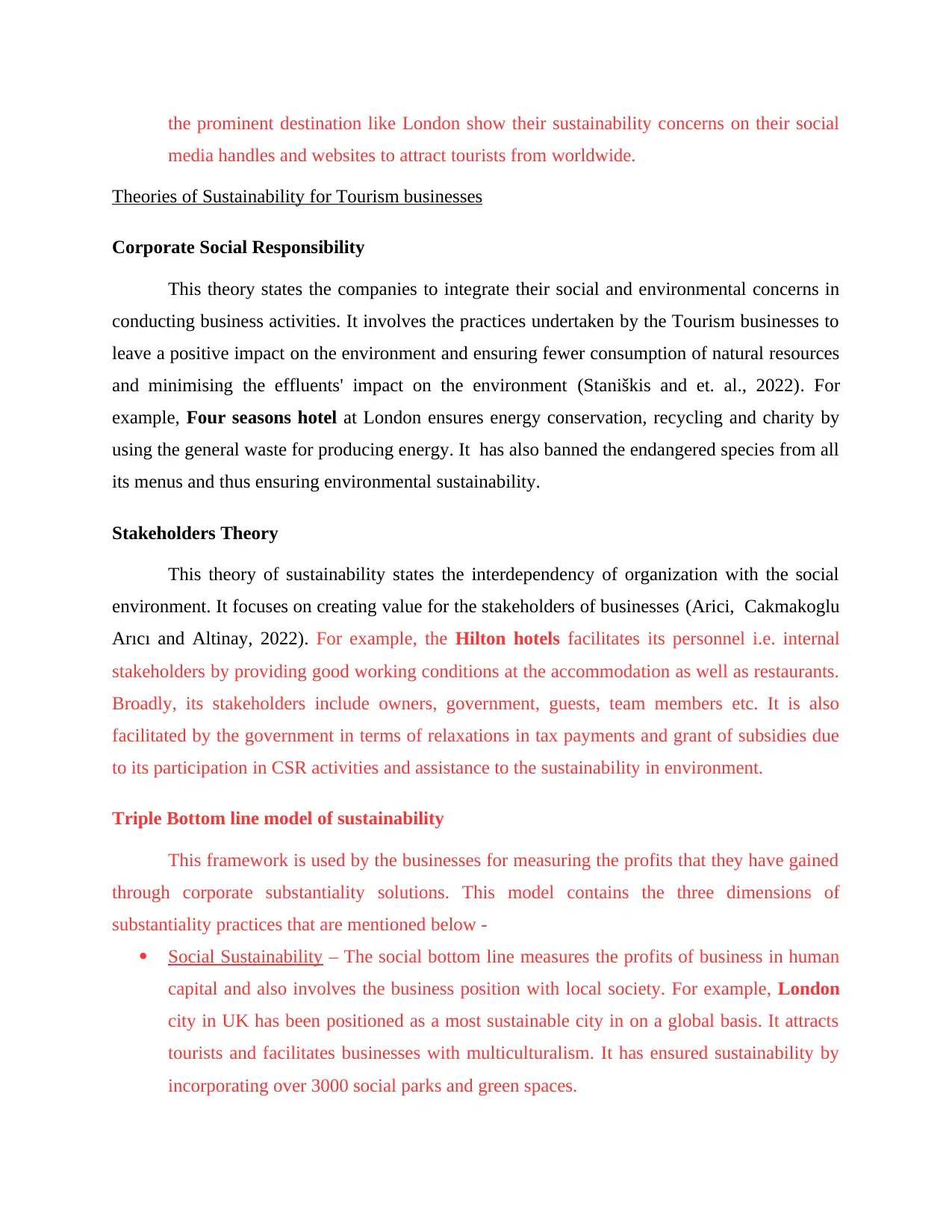
the prominent destination like London show their sustainability concerns on their social
media handles and websites to attract tourists from worldwide.
Theories of Sustainability for Tourism businesses
Corporate Social Responsibility
This theory states the companies to integrate their social and environmental concerns in
conducting business activities. It involves the practices undertaken by the Tourism businesses to
leave a positive impact on the environment and ensuring fewer consumption of natural resources
and minimising the effluents' impact on the environment (Staniškis and et. al., 2022). For
example, Four seasons hotel at London ensures energy conservation, recycling and charity by
using the general waste for producing energy. It has also banned the endangered species from all
its menus and thus ensuring environmental sustainability.
Stakeholders Theory
This theory of sustainability states the interdependency of organization with the social
environment. It focuses on creating value for the stakeholders of businesses (Arici, Cakmakoglu
Arıcı and Altinay, 2022). For example, the Hilton hotels facilitates its personnel i.e. internal
stakeholders by providing good working conditions at the accommodation as well as restaurants.
Broadly, its stakeholders include owners, government, guests, team members etc. It is also
facilitated by the government in terms of relaxations in tax payments and grant of subsidies due
to its participation in CSR activities and assistance to the sustainability in environment.
Triple Bottom line model of sustainability
This framework is used by the businesses for measuring the profits that they have gained
through corporate substantiality solutions. This model contains the three dimensions of
substantiality practices that are mentioned below -
Social Sustainability – The social bottom line measures the profits of business in human
capital and also involves the business position with local society. For example, London
city in UK has been positioned as a most sustainable city in on a global basis. It attracts
tourists and facilitates businesses with multiculturalism. It has ensured sustainability by
incorporating over 3000 social parks and green spaces.
media handles and websites to attract tourists from worldwide.
Theories of Sustainability for Tourism businesses
Corporate Social Responsibility
This theory states the companies to integrate their social and environmental concerns in
conducting business activities. It involves the practices undertaken by the Tourism businesses to
leave a positive impact on the environment and ensuring fewer consumption of natural resources
and minimising the effluents' impact on the environment (Staniškis and et. al., 2022). For
example, Four seasons hotel at London ensures energy conservation, recycling and charity by
using the general waste for producing energy. It has also banned the endangered species from all
its menus and thus ensuring environmental sustainability.
Stakeholders Theory
This theory of sustainability states the interdependency of organization with the social
environment. It focuses on creating value for the stakeholders of businesses (Arici, Cakmakoglu
Arıcı and Altinay, 2022). For example, the Hilton hotels facilitates its personnel i.e. internal
stakeholders by providing good working conditions at the accommodation as well as restaurants.
Broadly, its stakeholders include owners, government, guests, team members etc. It is also
facilitated by the government in terms of relaxations in tax payments and grant of subsidies due
to its participation in CSR activities and assistance to the sustainability in environment.
Triple Bottom line model of sustainability
This framework is used by the businesses for measuring the profits that they have gained
through corporate substantiality solutions. This model contains the three dimensions of
substantiality practices that are mentioned below -
Social Sustainability – The social bottom line measures the profits of business in human
capital and also involves the business position with local society. For example, London
city in UK has been positioned as a most sustainable city in on a global basis. It attracts
tourists and facilitates businesses with multiculturalism. It has ensured sustainability by
incorporating over 3000 social parks and green spaces.
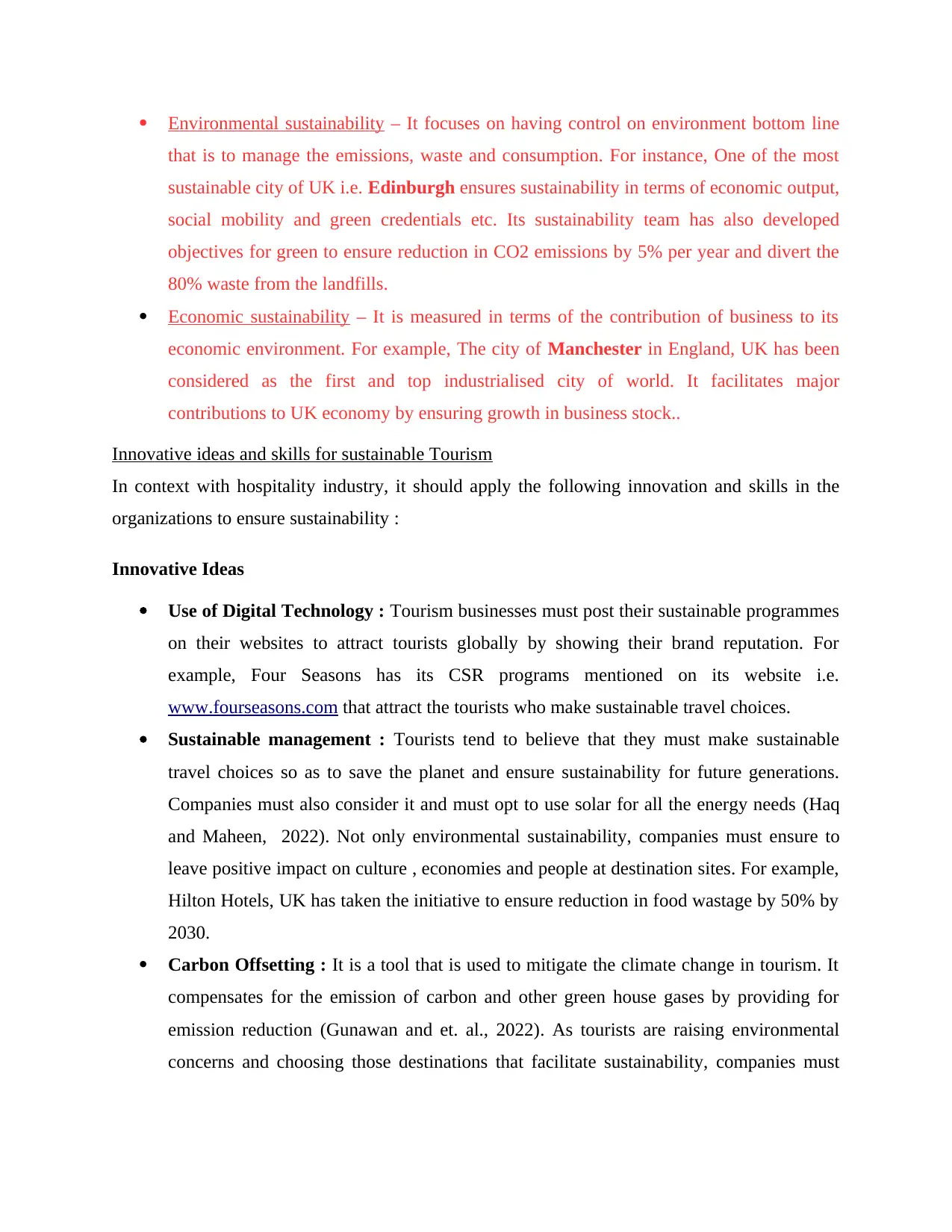
Environmental sustainability – It focuses on having control on environment bottom line
that is to manage the emissions, waste and consumption. For instance, One of the most
sustainable city of UK i.e. Edinburgh ensures sustainability in terms of economic output,
social mobility and green credentials etc. Its sustainability team has also developed
objectives for green to ensure reduction in CO2 emissions by 5% per year and divert the
80% waste from the landfills.
Economic sustainability – It is measured in terms of the contribution of business to its
economic environment. For example, The city of Manchester in England, UK has been
considered as the first and top industrialised city of world. It facilitates major
contributions to UK economy by ensuring growth in business stock..
Innovative ideas and skills for sustainable Tourism
In context with hospitality industry, it should apply the following innovation and skills in the
organizations to ensure sustainability :
Innovative Ideas
Use of Digital Technology : Tourism businesses must post their sustainable programmes
on their websites to attract tourists globally by showing their brand reputation. For
example, Four Seasons has its CSR programs mentioned on its website i.e.
www.fourseasons.com that attract the tourists who make sustainable travel choices.
Sustainable management : Tourists tend to believe that they must make sustainable
travel choices so as to save the planet and ensure sustainability for future generations.
Companies must also consider it and must opt to use solar for all the energy needs (Haq
and Maheen, 2022). Not only environmental sustainability, companies must ensure to
leave positive impact on culture , economies and people at destination sites. For example,
Hilton Hotels, UK has taken the initiative to ensure reduction in food wastage by 50% by
2030.
Carbon Offsetting : It is a tool that is used to mitigate the climate change in tourism. It
compensates for the emission of carbon and other green house gases by providing for
emission reduction (Gunawan and et. al., 2022). As tourists are raising environmental
concerns and choosing those destinations that facilitate sustainability, companies must
that is to manage the emissions, waste and consumption. For instance, One of the most
sustainable city of UK i.e. Edinburgh ensures sustainability in terms of economic output,
social mobility and green credentials etc. Its sustainability team has also developed
objectives for green to ensure reduction in CO2 emissions by 5% per year and divert the
80% waste from the landfills.
Economic sustainability – It is measured in terms of the contribution of business to its
economic environment. For example, The city of Manchester in England, UK has been
considered as the first and top industrialised city of world. It facilitates major
contributions to UK economy by ensuring growth in business stock..
Innovative ideas and skills for sustainable Tourism
In context with hospitality industry, it should apply the following innovation and skills in the
organizations to ensure sustainability :
Innovative Ideas
Use of Digital Technology : Tourism businesses must post their sustainable programmes
on their websites to attract tourists globally by showing their brand reputation. For
example, Four Seasons has its CSR programs mentioned on its website i.e.
www.fourseasons.com that attract the tourists who make sustainable travel choices.
Sustainable management : Tourists tend to believe that they must make sustainable
travel choices so as to save the planet and ensure sustainability for future generations.
Companies must also consider it and must opt to use solar for all the energy needs (Haq
and Maheen, 2022). Not only environmental sustainability, companies must ensure to
leave positive impact on culture , economies and people at destination sites. For example,
Hilton Hotels, UK has taken the initiative to ensure reduction in food wastage by 50% by
2030.
Carbon Offsetting : It is a tool that is used to mitigate the climate change in tourism. It
compensates for the emission of carbon and other green house gases by providing for
emission reduction (Gunawan and et. al., 2022). As tourists are raising environmental
concerns and choosing those destinations that facilitate sustainability, companies must
Paraphrase This Document
Need a fresh take? Get an instant paraphrase of this document with our AI Paraphraser
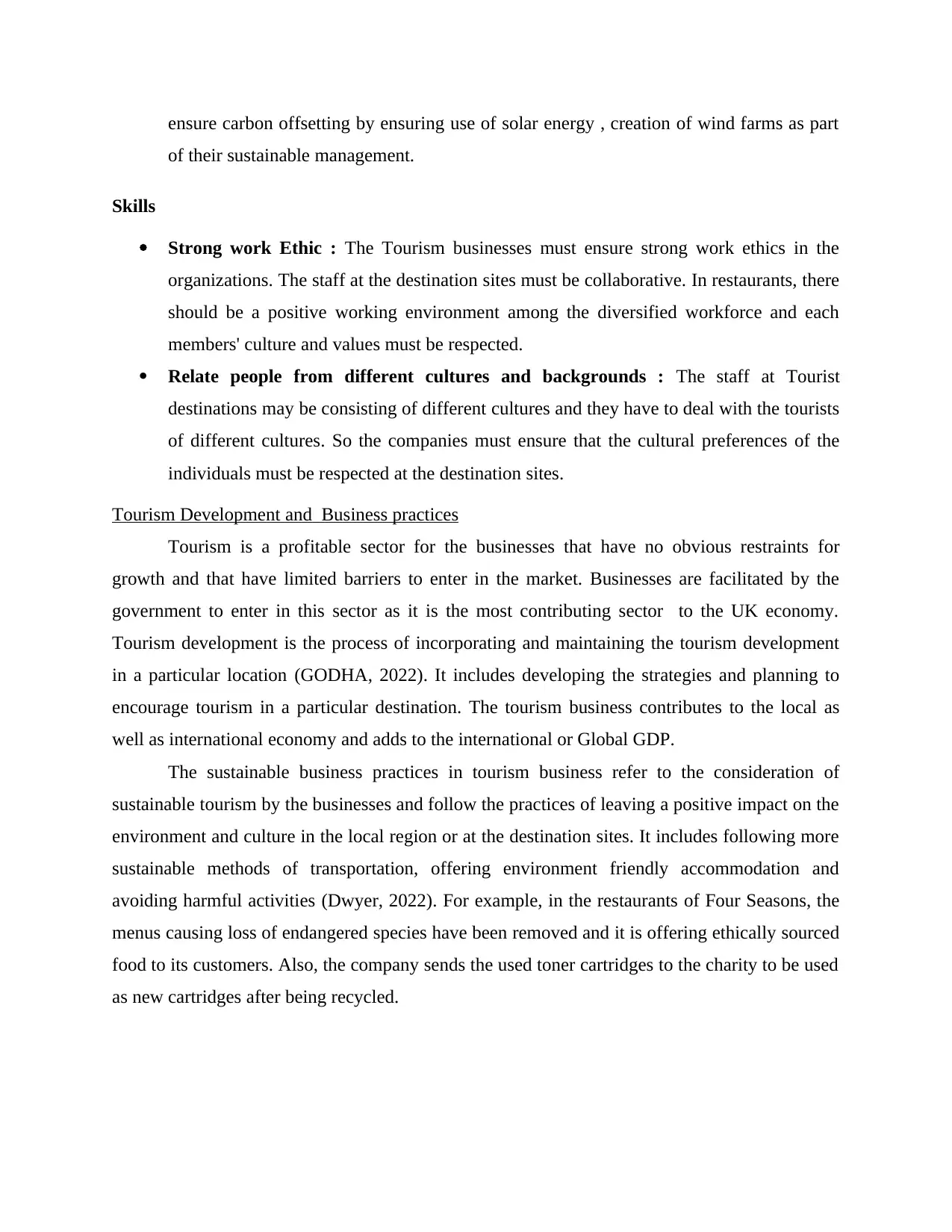
ensure carbon offsetting by ensuring use of solar energy , creation of wind farms as part
of their sustainable management.
Skills
Strong work Ethic : The Tourism businesses must ensure strong work ethics in the
organizations. The staff at the destination sites must be collaborative. In restaurants, there
should be a positive working environment among the diversified workforce and each
members' culture and values must be respected.
Relate people from different cultures and backgrounds : The staff at Tourist
destinations may be consisting of different cultures and they have to deal with the tourists
of different cultures. So the companies must ensure that the cultural preferences of the
individuals must be respected at the destination sites.
Tourism Development and Business practices
Tourism is a profitable sector for the businesses that have no obvious restraints for
growth and that have limited barriers to enter in the market. Businesses are facilitated by the
government to enter in this sector as it is the most contributing sector to the UK economy.
Tourism development is the process of incorporating and maintaining the tourism development
in a particular location (GODHA, 2022). It includes developing the strategies and planning to
encourage tourism in a particular destination. The tourism business contributes to the local as
well as international economy and adds to the international or Global GDP.
The sustainable business practices in tourism business refer to the consideration of
sustainable tourism by the businesses and follow the practices of leaving a positive impact on the
environment and culture in the local region or at the destination sites. It includes following more
sustainable methods of transportation, offering environment friendly accommodation and
avoiding harmful activities (Dwyer, 2022). For example, in the restaurants of Four Seasons, the
menus causing loss of endangered species have been removed and it is offering ethically sourced
food to its customers. Also, the company sends the used toner cartridges to the charity to be used
as new cartridges after being recycled.
of their sustainable management.
Skills
Strong work Ethic : The Tourism businesses must ensure strong work ethics in the
organizations. The staff at the destination sites must be collaborative. In restaurants, there
should be a positive working environment among the diversified workforce and each
members' culture and values must be respected.
Relate people from different cultures and backgrounds : The staff at Tourist
destinations may be consisting of different cultures and they have to deal with the tourists
of different cultures. So the companies must ensure that the cultural preferences of the
individuals must be respected at the destination sites.
Tourism Development and Business practices
Tourism is a profitable sector for the businesses that have no obvious restraints for
growth and that have limited barriers to enter in the market. Businesses are facilitated by the
government to enter in this sector as it is the most contributing sector to the UK economy.
Tourism development is the process of incorporating and maintaining the tourism development
in a particular location (GODHA, 2022). It includes developing the strategies and planning to
encourage tourism in a particular destination. The tourism business contributes to the local as
well as international economy and adds to the international or Global GDP.
The sustainable business practices in tourism business refer to the consideration of
sustainable tourism by the businesses and follow the practices of leaving a positive impact on the
environment and culture in the local region or at the destination sites. It includes following more
sustainable methods of transportation, offering environment friendly accommodation and
avoiding harmful activities (Dwyer, 2022). For example, in the restaurants of Four Seasons, the
menus causing loss of endangered species have been removed and it is offering ethically sourced
food to its customers. Also, the company sends the used toner cartridges to the charity to be used
as new cartridges after being recycled.
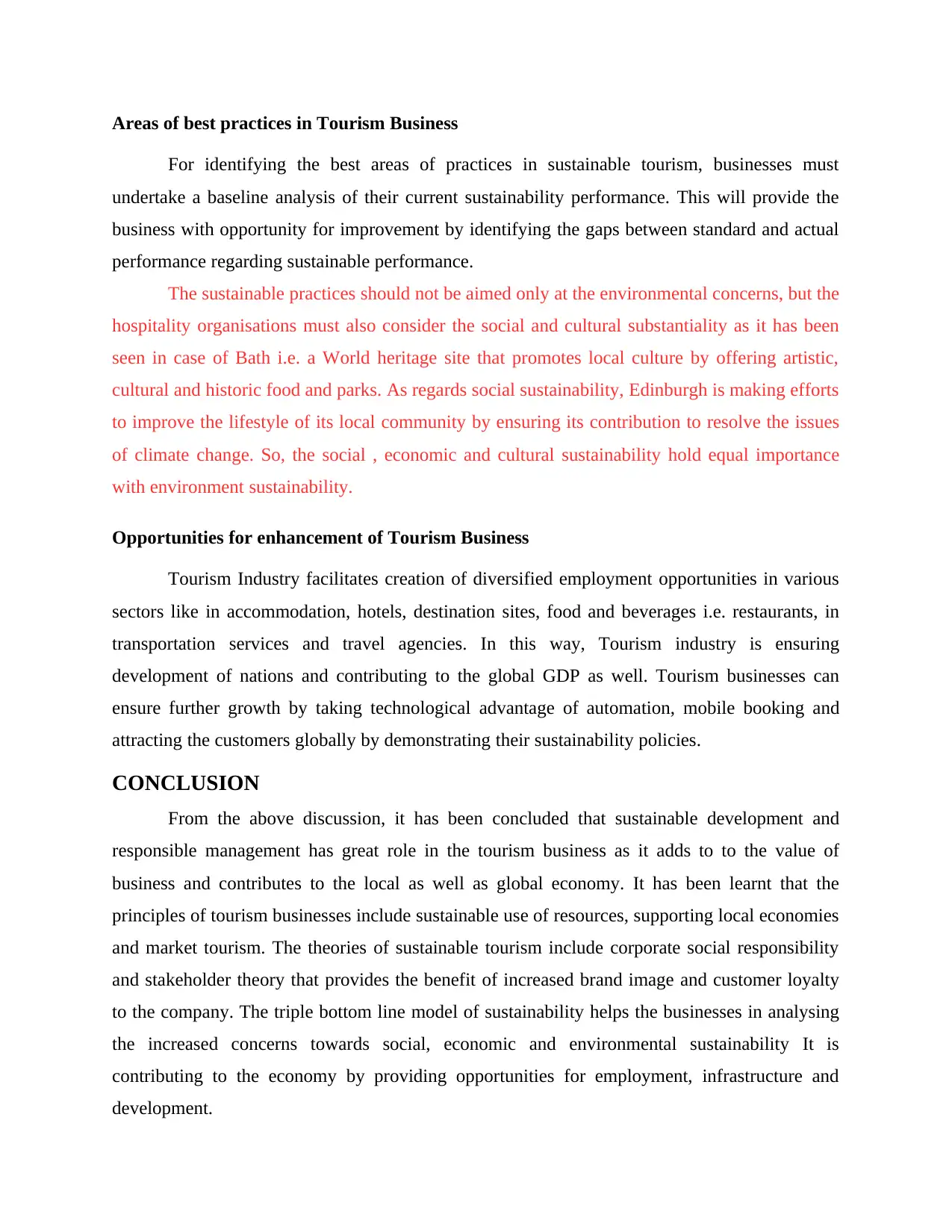
Areas of best practices in Tourism Business
For identifying the best areas of practices in sustainable tourism, businesses must
undertake a baseline analysis of their current sustainability performance. This will provide the
business with opportunity for improvement by identifying the gaps between standard and actual
performance regarding sustainable performance.
The sustainable practices should not be aimed only at the environmental concerns, but the
hospitality organisations must also consider the social and cultural substantiality as it has been
seen in case of Bath i.e. a World heritage site that promotes local culture by offering artistic,
cultural and historic food and parks. As regards social sustainability, Edinburgh is making efforts
to improve the lifestyle of its local community by ensuring its contribution to resolve the issues
of climate change. So, the social , economic and cultural sustainability hold equal importance
with environment sustainability.
Opportunities for enhancement of Tourism Business
Tourism Industry facilitates creation of diversified employment opportunities in various
sectors like in accommodation, hotels, destination sites, food and beverages i.e. restaurants, in
transportation services and travel agencies. In this way, Tourism industry is ensuring
development of nations and contributing to the global GDP as well. Tourism businesses can
ensure further growth by taking technological advantage of automation, mobile booking and
attracting the customers globally by demonstrating their sustainability policies.
CONCLUSION
From the above discussion, it has been concluded that sustainable development and
responsible management has great role in the tourism business as it adds to to the value of
business and contributes to the local as well as global economy. It has been learnt that the
principles of tourism businesses include sustainable use of resources, supporting local economies
and market tourism. The theories of sustainable tourism include corporate social responsibility
and stakeholder theory that provides the benefit of increased brand image and customer loyalty
to the company. The triple bottom line model of sustainability helps the businesses in analysing
the increased concerns towards social, economic and environmental sustainability It is
contributing to the economy by providing opportunities for employment, infrastructure and
development.
For identifying the best areas of practices in sustainable tourism, businesses must
undertake a baseline analysis of their current sustainability performance. This will provide the
business with opportunity for improvement by identifying the gaps between standard and actual
performance regarding sustainable performance.
The sustainable practices should not be aimed only at the environmental concerns, but the
hospitality organisations must also consider the social and cultural substantiality as it has been
seen in case of Bath i.e. a World heritage site that promotes local culture by offering artistic,
cultural and historic food and parks. As regards social sustainability, Edinburgh is making efforts
to improve the lifestyle of its local community by ensuring its contribution to resolve the issues
of climate change. So, the social , economic and cultural sustainability hold equal importance
with environment sustainability.
Opportunities for enhancement of Tourism Business
Tourism Industry facilitates creation of diversified employment opportunities in various
sectors like in accommodation, hotels, destination sites, food and beverages i.e. restaurants, in
transportation services and travel agencies. In this way, Tourism industry is ensuring
development of nations and contributing to the global GDP as well. Tourism businesses can
ensure further growth by taking technological advantage of automation, mobile booking and
attracting the customers globally by demonstrating their sustainability policies.
CONCLUSION
From the above discussion, it has been concluded that sustainable development and
responsible management has great role in the tourism business as it adds to to the value of
business and contributes to the local as well as global economy. It has been learnt that the
principles of tourism businesses include sustainable use of resources, supporting local economies
and market tourism. The theories of sustainable tourism include corporate social responsibility
and stakeholder theory that provides the benefit of increased brand image and customer loyalty
to the company. The triple bottom line model of sustainability helps the businesses in analysing
the increased concerns towards social, economic and environmental sustainability It is
contributing to the economy by providing opportunities for employment, infrastructure and
development.
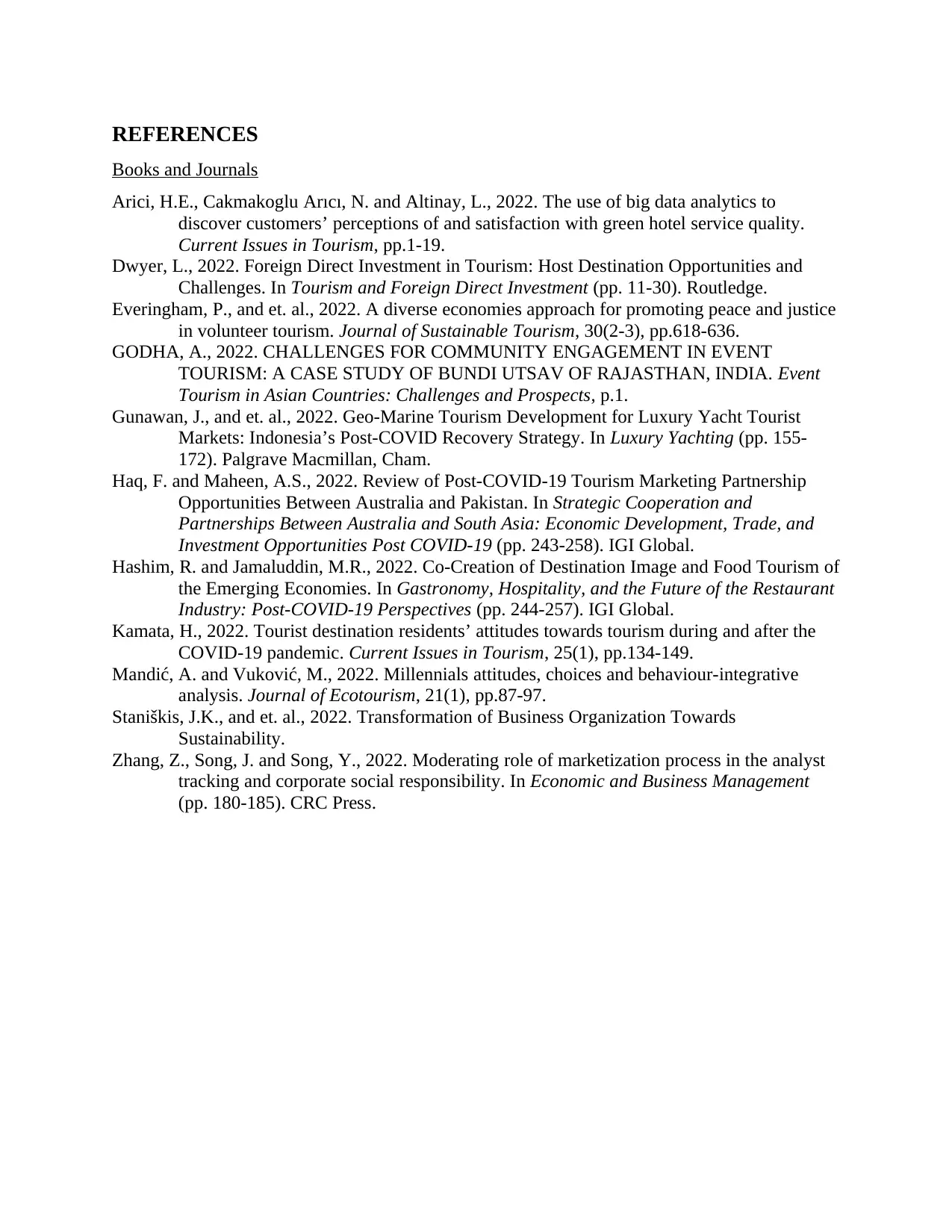
REFERENCES
Books and Journals
Arici, H.E., Cakmakoglu Arıcı, N. and Altinay, L., 2022. The use of big data analytics to
discover customers’ perceptions of and satisfaction with green hotel service quality.
Current Issues in Tourism, pp.1-19.
Dwyer, L., 2022. Foreign Direct Investment in Tourism: Host Destination Opportunities and
Challenges. In Tourism and Foreign Direct Investment (pp. 11-30). Routledge.
Everingham, P., and et. al., 2022. A diverse economies approach for promoting peace and justice
in volunteer tourism. Journal of Sustainable Tourism, 30(2-3), pp.618-636.
GODHA, A., 2022. CHALLENGES FOR COMMUNITY ENGAGEMENT IN EVENT
TOURISM: A CASE STUDY OF BUNDI UTSAV OF RAJASTHAN, INDIA. Event
Tourism in Asian Countries: Challenges and Prospects, p.1.
Gunawan, J., and et. al., 2022. Geo-Marine Tourism Development for Luxury Yacht Tourist
Markets: Indonesia’s Post-COVID Recovery Strategy. In Luxury Yachting (pp. 155-
172). Palgrave Macmillan, Cham.
Haq, F. and Maheen, A.S., 2022. Review of Post-COVID-19 Tourism Marketing Partnership
Opportunities Between Australia and Pakistan. In Strategic Cooperation and
Partnerships Between Australia and South Asia: Economic Development, Trade, and
Investment Opportunities Post COVID-19 (pp. 243-258). IGI Global.
Hashim, R. and Jamaluddin, M.R., 2022. Co-Creation of Destination Image and Food Tourism of
the Emerging Economies. In Gastronomy, Hospitality, and the Future of the Restaurant
Industry: Post-COVID-19 Perspectives (pp. 244-257). IGI Global.
Kamata, H., 2022. Tourist destination residents’ attitudes towards tourism during and after the
COVID-19 pandemic. Current Issues in Tourism, 25(1), pp.134-149.
Mandić, A. and Vuković, M., 2022. Millennials attitudes, choices and behaviour-integrative
analysis. Journal of Ecotourism, 21(1), pp.87-97.
Staniškis, J.K., and et. al., 2022. Transformation of Business Organization Towards
Sustainability.
Zhang, Z., Song, J. and Song, Y., 2022. Moderating role of marketization process in the analyst
tracking and corporate social responsibility. In Economic and Business Management
(pp. 180-185). CRC Press.
Books and Journals
Arici, H.E., Cakmakoglu Arıcı, N. and Altinay, L., 2022. The use of big data analytics to
discover customers’ perceptions of and satisfaction with green hotel service quality.
Current Issues in Tourism, pp.1-19.
Dwyer, L., 2022. Foreign Direct Investment in Tourism: Host Destination Opportunities and
Challenges. In Tourism and Foreign Direct Investment (pp. 11-30). Routledge.
Everingham, P., and et. al., 2022. A diverse economies approach for promoting peace and justice
in volunteer tourism. Journal of Sustainable Tourism, 30(2-3), pp.618-636.
GODHA, A., 2022. CHALLENGES FOR COMMUNITY ENGAGEMENT IN EVENT
TOURISM: A CASE STUDY OF BUNDI UTSAV OF RAJASTHAN, INDIA. Event
Tourism in Asian Countries: Challenges and Prospects, p.1.
Gunawan, J., and et. al., 2022. Geo-Marine Tourism Development for Luxury Yacht Tourist
Markets: Indonesia’s Post-COVID Recovery Strategy. In Luxury Yachting (pp. 155-
172). Palgrave Macmillan, Cham.
Haq, F. and Maheen, A.S., 2022. Review of Post-COVID-19 Tourism Marketing Partnership
Opportunities Between Australia and Pakistan. In Strategic Cooperation and
Partnerships Between Australia and South Asia: Economic Development, Trade, and
Investment Opportunities Post COVID-19 (pp. 243-258). IGI Global.
Hashim, R. and Jamaluddin, M.R., 2022. Co-Creation of Destination Image and Food Tourism of
the Emerging Economies. In Gastronomy, Hospitality, and the Future of the Restaurant
Industry: Post-COVID-19 Perspectives (pp. 244-257). IGI Global.
Kamata, H., 2022. Tourist destination residents’ attitudes towards tourism during and after the
COVID-19 pandemic. Current Issues in Tourism, 25(1), pp.134-149.
Mandić, A. and Vuković, M., 2022. Millennials attitudes, choices and behaviour-integrative
analysis. Journal of Ecotourism, 21(1), pp.87-97.
Staniškis, J.K., and et. al., 2022. Transformation of Business Organization Towards
Sustainability.
Zhang, Z., Song, J. and Song, Y., 2022. Moderating role of marketization process in the analyst
tracking and corporate social responsibility. In Economic and Business Management
(pp. 180-185). CRC Press.
1 out of 10
Related Documents
Your All-in-One AI-Powered Toolkit for Academic Success.
+13062052269
info@desklib.com
Available 24*7 on WhatsApp / Email
![[object Object]](/_next/static/media/star-bottom.7253800d.svg)
Unlock your academic potential
© 2024 | Zucol Services PVT LTD | All rights reserved.